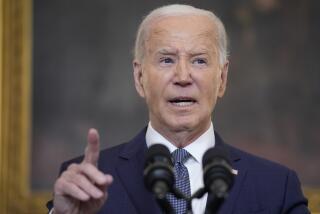Washington Gives Baghdad New List of Demands
- Share via
WASHINGTON — The Clinton administration has sent Iraq new demands, and officials said Baghdad’s response to them will determine whether the United States launches more attacks or gradually returns to a more normal military posture in the Middle East, U.S. officials said Tuesday.
Although senior officials declined to disclose details, they said the list outlines steps that Washington considers essential to ensuring the safety of U.S. and allied pilots patrolling the “no-fly” zones that stretch across northern and southern regions of Iraq.
State Department spokesman Nicholas Burns told reporters that the U.S. will monitor the situation over the next few days to see how Iraqi President Saddam Hussein reacts.
“The ball is in his court,” Burns said, referring to Hussein. “His actions will determine the actions of the United States, and we’ll certainly be watching that very carefully.”
Burns said the administration had not set a deadline for Iraqi compliance.
U.S. officials said the administration does not want to release details of Washington’s demands because that almost certainly would discourage Hussein from complying.
“If we say them publicly, he just won’t do them,” one strategist said.
Still, officials hinted that the list probably includes removing mobile missile-launchers that Iraq has deployed in the southern “no-fly” zone. They are considered particularly dangerous because they are harder for allied planes to target.
The move came as, separately, the Pentagon announced that it was deploying 3,500 U.S. ground troops to Kuwait--a smaller force than the 5,000 initially planned but the most that Kuwait will permit.
Reports from Kuwait on Monday had put that limit at 3,000.
The soldiers, who will leave this week from Ft. Hood, Texas, will join 1,200 other U.S. ground troops now conducting military exercises in Kuwait. The move is designed as a show of force intended to discourage Iraq from invading Kuwait again.
President Clinton and Defense Secretary William J. Perry met with Republican and Democratic congressional leaders to tell them the administration’s plans, but they apparently won few new supporters.
Sen. John McCain (R-Ariz.), a member of the Senate Armed Services Committee, said after the meeting that, although the president listened attentively, several important questions “remain unresolved.”
“What they have done is, unfortunately, not matched deeds with rhetoric,” he said of the administration, “and that’s what causes problems” in international affairs.
McCain asserted that Hussein is now “far better off than he was two weeks ago.”
Officials said the administration decided to send the new demands to Iraq partly because it believes that it has strengthened its military power in the area, so Hussein is likely to pay more attention than he did earlier this month, when the last list was sent.
“The situation has evolved significantly since the delivery of the first [communication], which I believe was a week ago Friday . . . and our leadership felt it was important to send a second one,” Burns told reporters.
Besides the 3,500 U.S. troops being sent to Kuwait, the United States now has several hundred warplanes--including eight radar-evading F-117A stealth fighters and four B-52 bombers--and two Navy aircraft carrier battle groups in the region.
Perry said Tuesday that Iraq appears to be abiding by its pledges not to shoot at allied warplanes patrolling the “no-fly” zones and to stop repairing air defense batteries that were damaged during the U.S. cruise missile strikes two weeks ago.
“In the last few days, the Iraqis have been backing off the threatening moves they were making against our air crews,” he told reporters.
But, he added, if the Iraqis resume their threats, “we will respond very sharply.”
The administration also announced that it is launching an effort to try to stop the fighting between the two rival Kurdish factions, whose civil war touched off the Iraqi attack that triggered the crisis.
The State Department said Assistant Secretary of State Robert Pelletreau would meet in Ankara, Turkey, today with Masoud Barzani, leader of the Iraqi-allied Democratic Party of Kurdistan, to discuss prospects for reviving the alliance between the two factions.
While Barzani’s faction has linked itself with Iraq, its rival, the Patriotic Union of Kurdistan headed by Jalal Talabani, has aligned itself with Iran.
Burns said the United States believes that both factions had “made a tactical mistake.”
Separately, France announced Tuesday that it had agreed in principle to permit U.S. fighters to fly over French territory if Washington eventually decides to launch a retaliatory attack against Iraq, but Paris also warned that such decisions will be made on a case-by-case basis.
France had opposed the U.S. cruise missile attacks two weeks ago, arguing that they were not justified by Iraq’s behavior and charging that the whole effort was little more than a U.S. election-year ploy.
Times staff writer John Daniszewski in Amman, Jordan, and special correspondent Hugh Pope in Istanbul, Turkey, contributed to this report.
More to Read
Sign up for Essential California
The most important California stories and recommendations in your inbox every morning.
You may occasionally receive promotional content from the Los Angeles Times.













